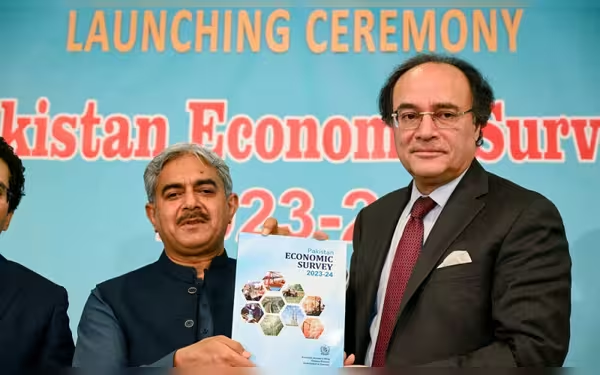Tuesday, July 2, 2024 03:09 PM
Finance Minister Aurangzeb Optimistic on Pakistan's Economic Strategy
- Confidence in meeting external debt obligations
- Emphasis on IMF programme implementation
- Strategic measures for managing debt repayments effectively
 Image Credits: brecorder
Image Credits: brecorderPakistan's Finance Minister Aurangzeb discusses the country's economic situation, emphasizing debt repayment strategies and engagement with international financial institutions for stability.
Pakistan's Finance Minister, Muhammad Aurangzeb, recently shared insights on the country's economic situation during the unveiling of the Economic Survey 2023-24. He expressed confidence in Pakistan's ability to meet its external debt obligations for the upcoming fiscal year, particularly highlighting the importance of implementing the IMF programme.
According to the State Bank of Pakistan, in the fiscal year 2023-24, Pakistan is required to service a total external debt of $24.3 billion, with $3.9 billion designated for interest payments and $20.4 billion for principal repayments. As of 11MFY24, $10.8 billion has already been paid, with an additional $1 billion expected to be paid by the end of the fiscal year.
Aurangzeb outlined Pakistan's strategy for managing external debt in FY25, emphasizing a continuation of the repayment schedule from the previous year. He also mentioned the potential resumption of commercial bank borrowing and highlighted the country's improved external financial position compared to the previous period.
The finance minister acknowledged the challenges posed by delayed IMF programmes on Pakistan's credit ratings and external support from Middle Eastern commercial banks. Despite this, he expressed optimism about Pakistan's ability to handle debt repayments and hinted at potential future borrowing from commercial banks.
Aurangzeb confirmed the government's ongoing engagement with rating agencies and expressed interest in securing an Extended Fund Facility (EFF) from the IMF to ensure long-term macroeconomic stability. Additionally, plans for issuing a Panda bond in the upcoming fiscal year were mentioned as part of Pakistan's financial strategy.
In recent years, Pakistan's economic activity has been impacted by stringent IMF reforms aimed at stabilizing the economy. The government's primary focus remains on securing a sustainable IMF programme to achieve lasting macroeconomic stability and enhance credit ratings.
Despite the challenges posed by external debt obligations, Pakistan's government, under the leadership of Finance Minister Aurangzeb, is committed to implementing strategic measures to manage debt repayments effectively. By engaging with international financial institutions and exploring diverse borrowing options, Pakistan aims to strengthen its economic position and ensure stability for the future.













